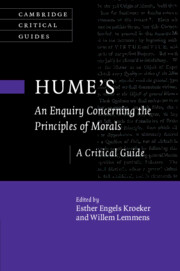Book contents
- Hume’s An Enquiry Concerning the Principles of Morals
- Cambridge Critical Guides
- Hume’s An Enquiry Concerning the Principles of Morals
- Copyright page
- Contents
- Contributors
- Acknowledgments
- Abbreviations
- Introduction
- Chapter 1 The Nature of Morals Founded on the Human Fabric
- Chapter 2 The Pride of Pericles
- Chapter 3 Justice and Politics in the Enquiry Concerning the Principles of Morals
- Chapter 4 History, Context, and the Conventions of Political Society
- Chapter 5 “Why Utility Pleases”
- Chapter 6 Hume on Talents and Moral Virtues
- Chapter 7 Virtues Suspect and Sublime
- Chapter 8 Sympathy and the Sources of Moral Sentiment
- Chapter 9 Virtue and Moral Psychology in the Enquiry Concerning the Principles of Morals
- Chapter 10 Hume, Cicero, and the Ancients
- Chapter 11 Hume on Religion in the Enquiry Concerning the Principles of Morals
- Chapter 12 Moral Disagreement
- Bibliography
- Index
- Cambridge Critical Guides
Chapter 7 - Virtues Suspect and Sublime
Published online by Cambridge University Press: 08 January 2021
- Hume’s An Enquiry Concerning the Principles of Morals
- Cambridge Critical Guides
- Hume’s An Enquiry Concerning the Principles of Morals
- Copyright page
- Contents
- Contributors
- Acknowledgments
- Abbreviations
- Introduction
- Chapter 1 The Nature of Morals Founded on the Human Fabric
- Chapter 2 The Pride of Pericles
- Chapter 3 Justice and Politics in the Enquiry Concerning the Principles of Morals
- Chapter 4 History, Context, and the Conventions of Political Society
- Chapter 5 “Why Utility Pleases”
- Chapter 6 Hume on Talents and Moral Virtues
- Chapter 7 Virtues Suspect and Sublime
- Chapter 8 Sympathy and the Sources of Moral Sentiment
- Chapter 9 Virtue and Moral Psychology in the Enquiry Concerning the Principles of Morals
- Chapter 10 Hume, Cicero, and the Ancients
- Chapter 11 Hume on Religion in the Enquiry Concerning the Principles of Morals
- Chapter 12 Moral Disagreement
- Bibliography
- Index
- Cambridge Critical Guides
Summary
The seventh section of An Enquiry Concerning the Principles of Morals is full of interesting puzzles. Why is courage treated here, among the virtues immediately agreeable to self, when it is useful to both its possessor and others? Why do so many of the virtues listed here seem like vices? And why does Hume linger on those virtues of which he seems the most suspicious? This chapter attempts to answer these questions. First, I outline the structure of the section and explain its oddities in more detail. These oddities reflect Hume’s ambivalence about some of the virtues immediately agreeable to self. Second, I argue for the importance of the aesthetic concept of the sublime for his treatment of these virtues. Appreciating this importance can illuminate some of the oddities. Finally, I argue that, although Hume believes that our attraction to these virtues needs correction, this correction cannot consist merely in judging these virtues against the standard of useful virtues. Instead, the correction requires another virtue immediately agreeable to self – delicacy of taste.
- Type
- Chapter
- Information
- Hume's An Enquiry Concerning the Principles of MoralsA Critical Guide, pp. 134 - 153Publisher: Cambridge University PressPrint publication year: 2021
- 2
- Cited by

